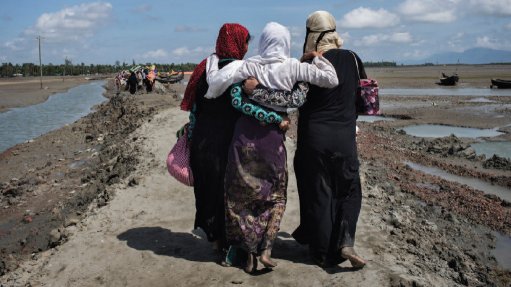
Since August 25, 2017, Burmese security forces have committed widespread rape against women and girls as part of a campaign of ethnic cleansing against Rohingya Muslims in Burma’s Rakhine State.
Killings, rapes, arbitrary arrests, and mass arson of homes by Burmese security forces in hundreds of predominantly Rohingya villages have forced more than 600,000 Rohingya to flee to neighbouring Bangladesh. Rohingya women, men, and children have arrived in Bangladesh in desperate condition—hungry, exhausted, and sometimes with rape, bullet, or burn injuries. The humanitarian crisis caused by Burma’s atrocities against the Rohingya has been staggering in both scale and speed.
The Burmese military’s brutal campaign follows attacks on 30 police posts and an army base by the Arakan Rohingya Salvation Army (ARSA) on the morning of August 25, 2017 in northern Rakhine State. The government reported that 11 security force personnel were killed. While the government had a duty to respond to the attacks, the Burmese military, supported by Border Police and armed ethnic Rakhine villagers, not only pursued those responsible, but immediately launched large-scale attacks against scores of Rohingya villages under the guise of counter-insurgency operations. Human Rights Watch has found that the violations committed by members of Burma’s security forces against the Rohingya population in northern Rakhine State since August 25 amount to crimes against humanity under international law.
This report is based on 52 interviews with Rohingya women and girls, including 29 survivors of rape, who fled to Bangladesh since these operations began. Rape survivors were from 19 different villages in Burma’s Rakhine State, mostly in northern Buthiduang and Maungdaw Townships. They described similarly brutal circumstances of the rapes. Human Rights Watch also spoke to 17 representatives of humanitarian organizations providing health services to women and girls in the refugee camps, including representatives of United Nations agencies and international and national nongovernmental organizations. We also interviewed two Bangladeshi government health officials.
Report by the Human Rights Watch